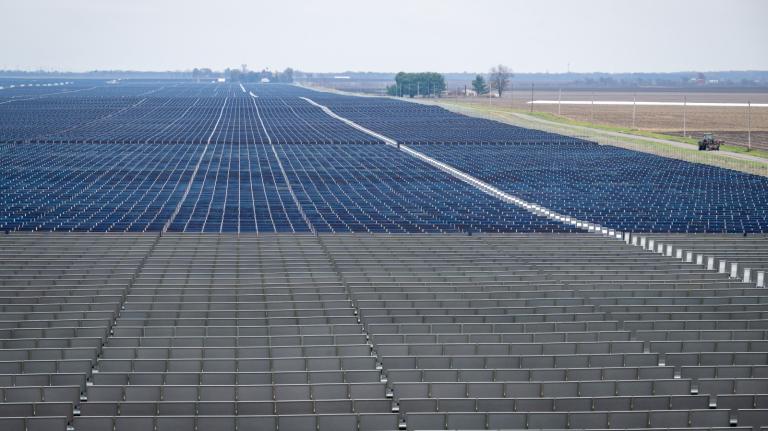 First up today, a session on utilities: "Big Energy, Big Vision — Utilities Making the Climate Commitment."
First up today, a session on utilities: "Big Energy, Big Vision — Utilities Making the Climate Commitment."
We’re starting off with a presentation from Janice Berman of PG&E, a northern California utility that’s way, way ahead of the pack on energy policy. Here’s an abridged list of what they’re doing:
- Funding renewables generation via solar, wind, tides, and biomass.
- Hooking customers up with solar systems (more than 1700 so far).
- Pushing hard on energy efficiency.
- Allowing customers to go climate neutral via offsets.
- A Sustainable Communities program focuses on holistic city and town sustainability (rather than merely efficiency), at the urban planning level.
- Helping Google develop plug-in hybrid vehicle-to-grid systems.
Pretty amazing stuff. I’ll be sitting down one-on-one with Berman later today.
Now there’s a woman (I missed her name) from Seattle City Light. SCL is 90% hydro, which is dependent on snowpack in the Cascades — naturally this makes climate change a scary problem for them, and they’re eager to take early action on it.
SCL is also the first utility in the nation to be completely carbon neutral, in every dept. Like so:
- SCL has some of the lowest rates of any comparable utility, but also the highest rates of conservation and efficiency. That’s the result of years of effort.
- SCL switched from partial ownership of a coal project to new renewables.
- The last bit they did by purchasing carbon offsets. She says it was really complicated, figuring out additionality, etc. Their offset purchases helped kickstart a city biofuels program; they worked to make sure that cruise ships don’t run diesel when they’re idling in port.
Next up, John Baker of Austin Energy — as y’all probably know, the city of Austin is incredibly progressive. Austin city facilities will be run entirely run on renewable energy by 2008, two years ahead of schedule. Wow. By 2015, committed to having a building code requiring zero-emissions residential and commercial buildings. By 2020, city fleet will be carbon neutral and 30% of all the city’s power will be renewable. Lord, this guy’s list is so long and going by so fast I can’t keep up.
Austin is having public charrettes, asking citizens how they’d like to go further green — this is partially to raise support for the first rate increase since 1994. Raising prices to go green, with public support! Wonders never cease.
Now some other guy’s talking. I don’t know who he is. He’s not on the program. Seems like a smart fellow, though. He says in the South and Northeast, businesses are well ahead of utilities in going green. Efforts are fragmented. Impact lags behind what’s happening in California.
SCL woman says that lots of public utility commissions in the middle of the country are still using the cost-plus model, rewarding utilities for sending out more energy. So that’s bad, but on the flip side, it’s a lot of low-hanging fruit waiting to be had. California’s PUC has decoupled utility earnings from electricity provision. That’s what enabled such great efficiency.
Wow, PG&E will spend $1 billion in the next two years on conservation, much of it through third-party vendors. That’s a huge depth of expertise and a vibrant market being created, that can readily be exported.
What’s the next big thing?
SCL lady: Smart, advanced metering. Information technology in the home.
PG&E’s Berman: Advanced metering. V2G systems. Community design / placemaking.
Random guy, who’s apparently named Todd and looks unsettlingly like Dick Cheney: Behavioral change. Too much pushing for demand management, haven’t tipped over into a market pull for it. Do more to spread best practices from the best utilities. Rationalize various demand response programs from different utilities. We need a national commission on energy security.
Austin Energy’s Baker: Demand-side management is entering the marketplace, taking on a life of its own outside of utility incentives.
This is all incredibly heartening stuff.

